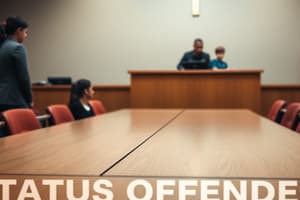Podcast
Questions and Answers
What are the three classifications of children under juvenile court jurisdiction?
What are the three classifications of children under juvenile court jurisdiction?
What are two factors that determine whether a juvenile court has jurisdiction?
What are two factors that determine whether a juvenile court has jurisdiction?
What are three types of juvenile courts?
What are three types of juvenile courts?
What are the essential characteristics of juvenile court?
What are the essential characteristics of juvenile court?
Identify and describe the three ways juveniles may be transferred to criminal court.
Identify and describe the three ways juveniles may be transferred to criminal court.
What might be the results of transferring a juvenile to adult court?
What might be the results of transferring a juvenile to adult court?
Define the following terms: adjudicated, certification, guardian ad litem, juvenile court, reverse waiver, statutory exclusion, waiver.
Define the following terms: adjudicated, certification, guardian ad litem, juvenile court, reverse waiver, statutory exclusion, waiver.
Being adjudicated as a delinquent is comparable to being convicted as an adult in criminal court.
Being adjudicated as a delinquent is comparable to being convicted as an adult in criminal court.
In some cases the juvenile court judge appoints a guardian ad litem to represent youths and their best interests.
In some cases the juvenile court judge appoints a guardian ad litem to represent youths and their best interests.
Statutory exclusion laws allow judges to decide which violent juveniles should be prosecuted by the criminal court.
Statutory exclusion laws allow judges to decide which violent juveniles should be prosecuted by the criminal court.
Today, the tone of juvenile justice is generally less harsh than it was when the concept of a juvenile court was first developed.
Today, the tone of juvenile justice is generally less harsh than it was when the concept of a juvenile court was first developed.
Jurisdiction of the juvenile court is determined by:
Jurisdiction of the juvenile court is determined by:
Juvenile Courts are separated into three types.
Juvenile Courts are separated into three types.
Juveniles may be transferred to criminal court via each the following EXCEPT a: ______
Juveniles may be transferred to criminal court via each the following EXCEPT a: ______
A major concern when transferring a juvenile to criminal court is that the juvenile:
A major concern when transferring a juvenile to criminal court is that the juvenile:
The jurisdiction of the juvenile court includes all the following children EXCEPT those who:
The jurisdiction of the juvenile court includes all the following children EXCEPT those who:
A petition is filed by the:
A petition is filed by the:
Juveniles may be transferred to criminal court via three basic mechanisms that include all of the following EXCEPT: ______
Juveniles may be transferred to criminal court via three basic mechanisms that include all of the following EXCEPT: ______
Flashcards are hidden until you start studying
Study Notes
Juvenile Court Classifications and Jurisdiction
- Three classifications of children under juvenile court jurisdiction: delinquents, status offenders, and dependent children.
- Factors determining juvenile court jurisdiction include the child's age and the nature of the offense.
Types and Characteristics of Juvenile Courts
- Three types of juvenile courts: juvenile delinquency courts, status offense courts, and dependency courts.
- Essential characteristics of juvenile court emphasize rehabilitation over punishment, confidentiality, and individualized treatment for minors.
Transfer to Criminal Court
- Three ways juveniles can be transferred to criminal court: judicial waiver (judge discretion), statutory exclusion (certain offenses automatically excluded), and prosecutorial discretion (prosecutor decides to file charges in adult court).
- Consequences of transferring a juvenile to adult court may include harsher penalties, incarceration in adult facilities, and lasting criminal records.
Key Terminology
- Adjudicated: formally judged in juvenile court.
- Certification: converting a juvenile case to adult court.
- Guardian ad litem: advocates for the minor's best interests in court.
- Reverse waiver: decision allowing a case to return to juvenile court from adult court.
- Statutory exclusion: certain offenses mandatorily excluded from juvenile court.
- Waiver: legal process transferring a juvenile to adult court.
Judicial Representation and Justice Tone
- Being adjudicated as a delinquent is analogous to an adult conviction, affecting future opportunities and rights.
- Judges can appoint a guardian ad litem to represent minors, ensuring their interests are prioritized during legal proceedings.
- Current juvenile justice tone is less punitive than in the past, reflecting a shift towards rehabilitation and support.
Jurisdiction Determination
- Jurisdiction of juvenile courts is defined by specific age ranges, offense types, and sometimes parental rights.
- Juvenile courts cater to various cases but exclude children who commit certain serious crimes or exceed jurisdiction age limits.
Petition Process
- A petition, which initiates what will happen with a juvenile case, is typically filed by the state, a parent, or guardian.
- Transfer processes may include certain exclusions and mechanisms not applicable to all cases, ensuring tailored handling of juvenile offenses.
Studying That Suits You
Use AI to generate personalized quizzes and flashcards to suit your learning preferences.




